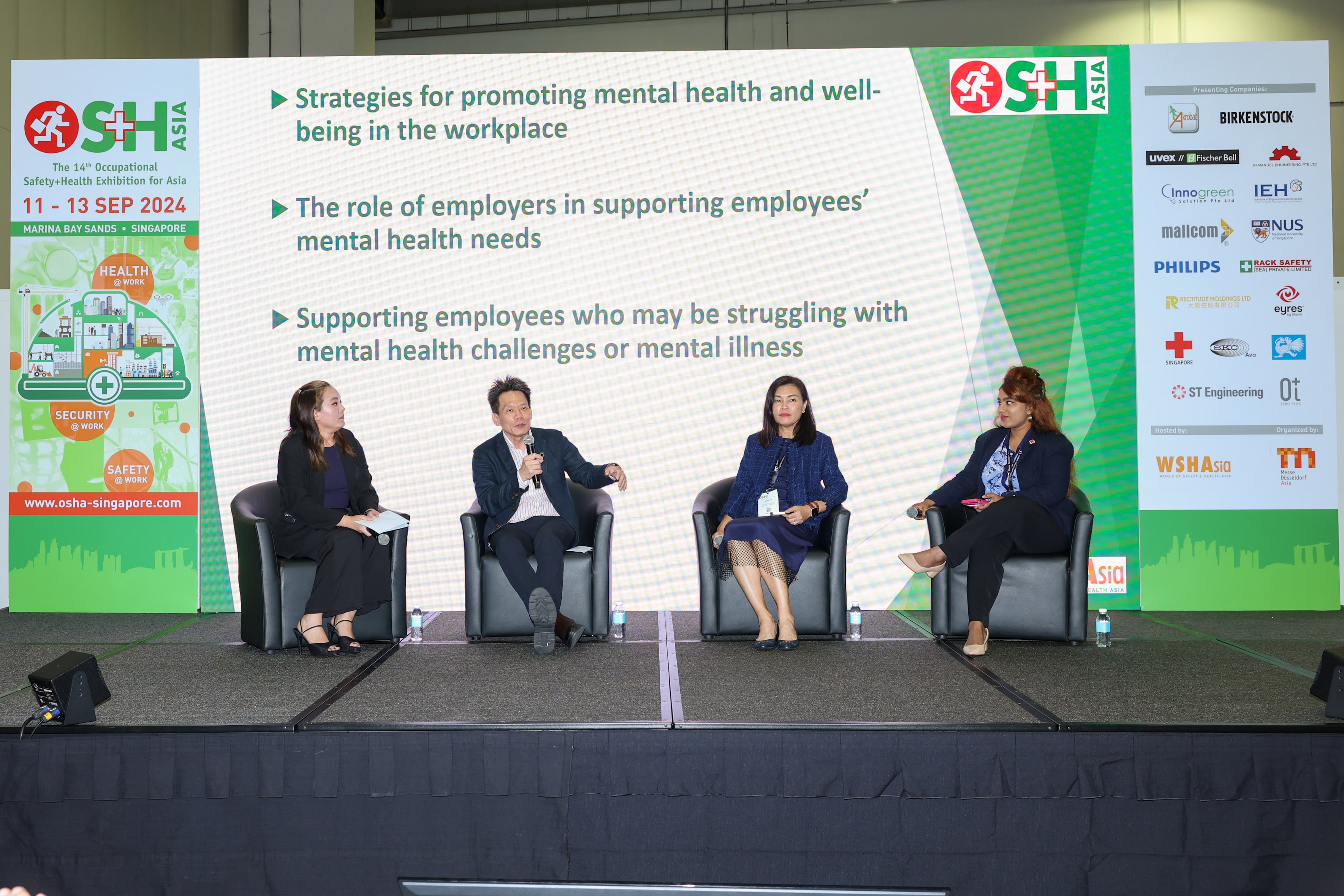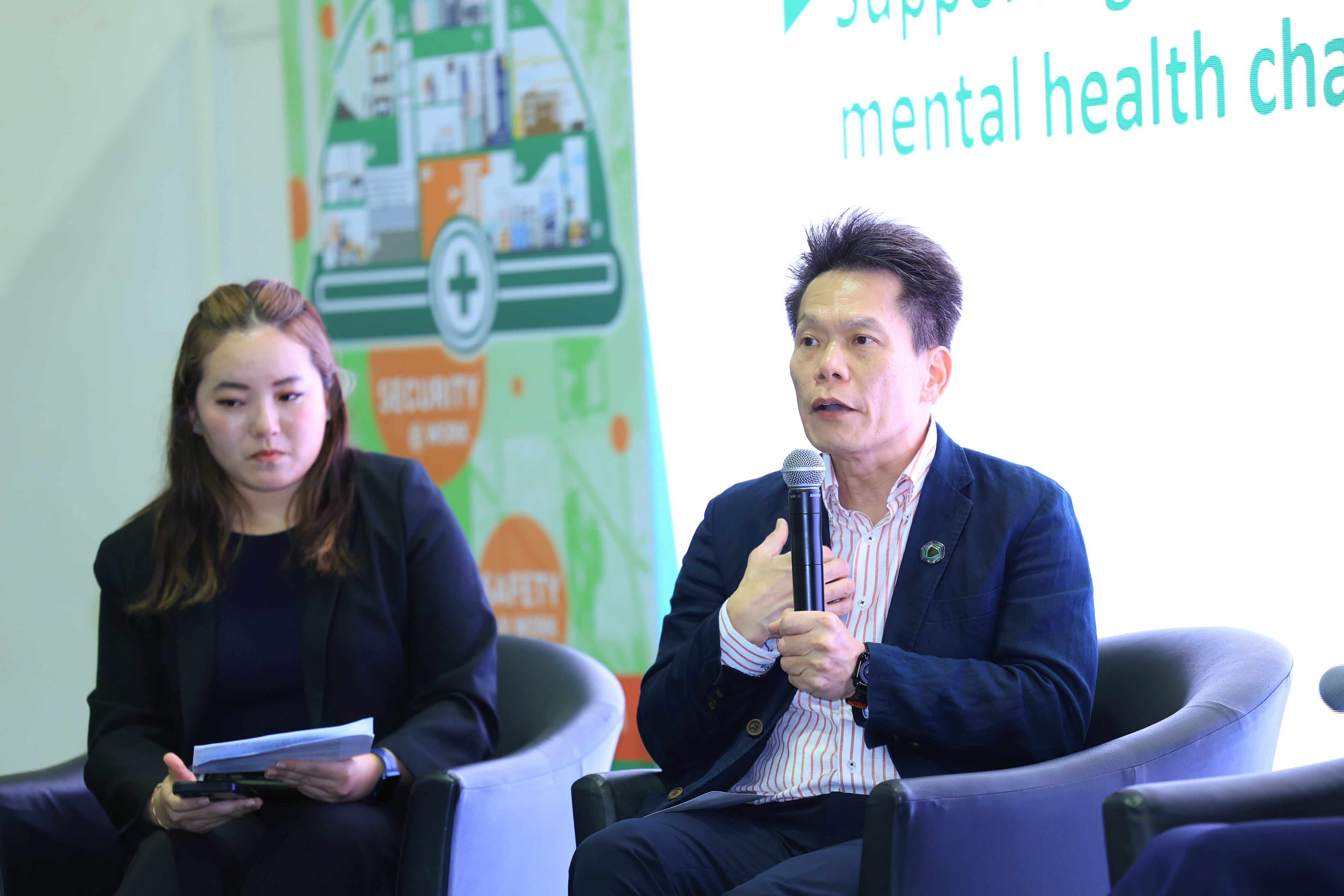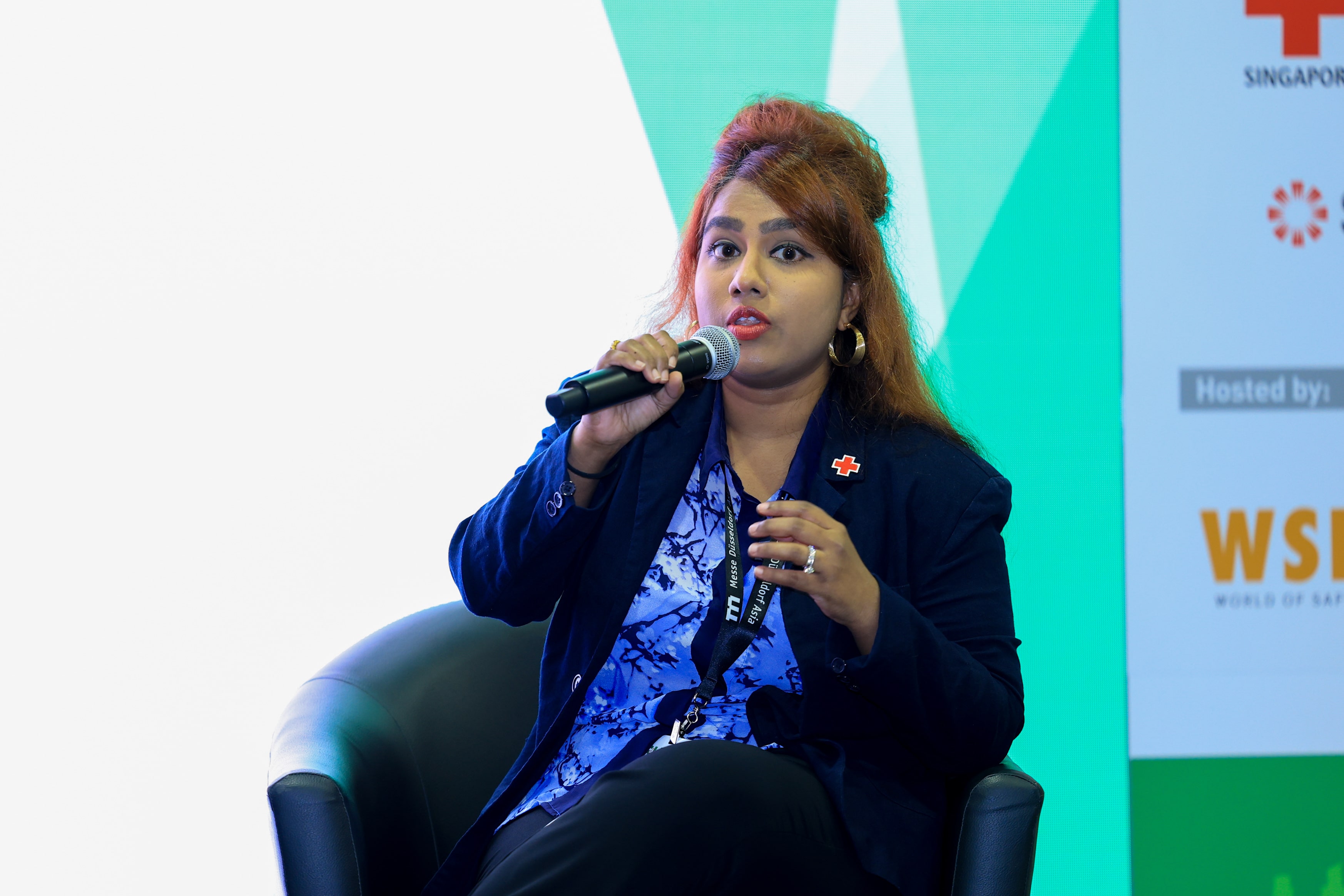
As the importance of mental well-being continues to gain traction in today's dynamic workplaces, corporations recognise employee well-being as a vital component of their success equation. At the 14th Occupational Safety + Health Exhibition for Asia (OSH Asia), a panel of experts shared strategies to empower organisations to better support employees' mental health at Sands Expo & Convention Centre on 11 September. From creating peer support networks to engaging government resources, the session shed light on the actionable practices companies can adopt to foster a positive mental health culture, where employees thrive, despite the work pressures.
The panel discussion featured panel speakers like Ms Aileen Tan, Chairperson of Workplace Safety and Health (WSH) Council's Mental Well-being Committee, Mr Dennis Mark, Chief Executive Officer from the Singapore Manufacturers Federation, and Ms Durga Naidu, Head of the Centre for Psychosocial Support (CPSS), at the Singapore Red Cross Academy (SRCA). Ms Amanda Tan, General Manager, Workplace Safety and Health Asia moderated the session.
Greater Awareness of Mental Health at Work
Given the dynamic business environment and nature of work, employees may grapple with a substantial workload that fuels heightened pressure at work. The inability to cope with the overwhelming workload may lead to employee burnout, high absenteeism, and low productivity spawned by their inability to focus.
In addition, with the burgeoning ageing population, Mr Mark and Ms Naidu pointed out that more employees have taken on the role of caregivers for their children and ageing parents, and may require support from employers.
Mr Mark underscored that mental health has gained prominence across various sectors, supported by government initiatives. At the management level, leaders are also cognisant that sales targets and traditional performance metrics should never be prioritised at the expense of the employees' mental well-being. Leaders recognise the importance of supporting employees' mental well-being.
There is a paradigm shift where employers acknowledge that mental well-being is less visible but as important as physical well-being. Just as physical first aid has first responders, Mr Mark accentuated the significance of establishing levels of support to offer immediate support to employees with mental issues or challenges. He shared that authorities and corporations are establishing a framework incorporating three levels.
Creating Peer Support Networks
At the first level, Mr Mark proposed that leaders could establish a peer support network and a mental well-being programme at the workplace to ensure the mental well-being of employees. Hewlett Packard's mental health champions intervened early, helping their employees navigate their challenges, and creating a more dedicated workforce. Echoing his stance, Ms Aileen Tan also championed the establishment of a peer support network trained to identify signs of underlying mental health issues and support colleagues who need help. Besides having regular check-ins on their colleague's well-being, the peer support network may share resources such as wellness apps, virtual support networks (live chats) or coaching that can indirectly help the colleague manage his or her stress. They may also recommend professional help or connect them with support groups.
Ms Aileen Tan also suggested establishing employee resource groups, safe spaces where employees with common interests, or shared concerns, such as parenting or caregiving can communicate openly. This underpins the fact that the employees' family life may inadvertently affect the employees' well-being and productivity at work.
By assessing the situation, the peer support network can ascertain if mental pressure can be alleviated by providing more supervision, determining if the targets are realistic and achievable, updating their objectives or extending the timeline if the deadlines cannot be met.
Psychological First Aid Training
The second level encompasses training employees in psychosocial support or Psychological First Aid (PFA) through providers such as SRCA's CPSS. Ms Naidu highlighted the importance of training employees in Psychological First Aid (PFA). This equips them to recognise distress in others and offer immediate support. The Singapore Red Cross (SRC) has made its PFA programme mandatory for all its employees to cope with mental health challenges, exemplifying how organisations can embed mental health into their culture. This enables the employees to manage the daily work pressures while supporting their peers.
Ms Aileen Tan advocated the First Responder training offered by the SRCA. The course enabled participants to identify the tell-tale signs if fellow employees are undergoing a challenging period, such as caring for their parents or going through a separation.
Leveraging Governmental Support
The third level refers to governmental support. Ms Aileen Tan highlighted the various programmes and frameworks that support mental health in the workplace.
WSH had established a mental well-being committee comprising employees across various sectors. In addition, the 'I Work Health' tool enables companies to assess the employees' mental well-being. Ms Aileen Tan advocated that companies partner with trade associations to care for their employees and training providers such as the SRCA to provide training on PFA. Mr Mark recommended that corporations may benefit from a playbook featuring the most optimal or successful mental well-being practices, case studies and policies in other companies.
To encourage a positive work culture, the WSH initiated the Care Award conferred to companies that demonstrate a culture of care, respect and empathy, ensuring the mental well-being of the employees at the workplace. Mental well-being is pertinent in big organisations and Small and Medium Enterprises (SMEs). Ms Aileen Tan recounted having had the privilege of assuming the role of the judge where she witnessed multi-national companies, SMEs, including construction companies, and manufacturing companies receiving the award. The awards were a testament to the mental well-being of the employees in these companies, amplifying productivity while establishing a healthier workforce.
Mr Mark urged companies to take advantage of and leverage the programmes by the government and community that support employees' mental well-being.
Leaders Champion a Culture of Compassion, Empathy and Care
Ensuring the mental well-being of employees at the workplace is not the sole responsibility of the Human Resources department. Ms Aileen Tan and Mr Mark underscored the indispensable role of the top management and leaders to "walk the talk" by championing good practices at the workplace and establishing a culture of compassion, empathy and care to support employees dealing with mental health challenges. Companies can embrace a holistic approach to mental well-being at the workplace.
Creating a Humanised Organisational Structure
- Beyond prioritising efficiency, productivity and profitability, Mr Mark urged leaders to create and inculcate a people-centric organisational structure and culture that supports employees' physical and mental well-being.
Encouraging Open Communication
- Sharing similar sentiments, Ms Naidu and Ms Aileen Tan highlighted that the top management plays a pivotal role by setting the tone and embracing a corporate culture of safety, open communication, open-mindedness and inclusion where employees feel safe to be vulnerable. This demonstrates the organisation's commitment to Diversity, Equality and Inclusivity (DEI). DEI is strongly associated with workplace productivity, well-being, and resilience. Nurturing an inclusive work environment can boost employee engagement, and catalyse teamwork, collaboration, and innovation, amplifying organisational performance.
Job Flexibility
- Job flexibility such as work-from-home policies, or customised work arrangements may help employees in managing their mental health.
Providing a Platform for Employees to Share Concerns Without Stigma
- By adopting the stance, "It's ok, not to be ok,", Mr Mark underscored that companies can provide a safe platform where employees can voice their concerns, and mental health challenges or issues without stigma. In the same vein, Ms Amanda Tan also pointed out that employers can ask employees how they are faring, and if they need help. Employers can also offer employees a safe space to share. These enable employees to navigate their work and personal issues with resilience, contributing to a healthy workplace.
Recognising and Appreciating Employees' Contributions
- Though employees are driven by different motivations, priorities, needs, and preferences, Ms Aileen Tan underscored that one common underlying motivation resonates with and spurs most employees-leaders' appreciation and recognition of employees' contributions. This is indispensable to the employees' well-being and happiness. The employees will feel that their work is purposeful, that they are making a positive difference in the community, and that they are valued. She pointed out that employees yearn for the sense of belonging, where they grow and learn, and stress levels are mitigated. This ensures the mental well-being of the workers.
Exercising Self-Care
- Besides caring for employees' mental well-being, Mr Mark also underscored the importance of leaders practising self-care while understanding their stressors and relievers. When leaders exercise self-care, that creates a ripple effect in the company and is adopted as a corporate culture.
When corporations foster a positive work culture of care, respect, empathy, and understanding, they ensure employees' well-being, and resilience. Nurturing an inclusive work environment can boost employee engagement, and drive teamwork, collaboration, and innovation. These bolster productivity, enhance employee satisfaction, and lower the rate of absenteeism, paving the way for a more committed workforce. In addition, prioritising DEI and workplace mental wellness aids in retaining and attracting top talent, adding a competitive edge to the organisation's brand and reputation in the sector.
|
For organisations interested in implementing Psychological First Aid training, Mental Well-being @ Workplace or setting up peer support networks, the Singapore Red Cross Academy offers comprehensive courses tailored to your needs. |



